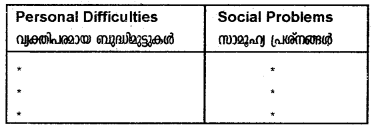Kerala Plus Two Sociology Chapter Wise Questions and Answers Chapter 1 Introducing Indian Society
Introducing Indian Society Questions and Answers
Question 1.
The ability to know how others look at us and the ability to look at ourselves from outside is called …..
Answer:
Reflexivity
Question 2.
Who is the social scientist that studied the relation between private difficulties and social problems?
Answer:
C. Ret Mills
Question 3.
The subject that studies about Society is called
Answer:
Sociology
Question 4.
…………. marks the place or position of a person in society.
Answer:
Social map
Question 5.
Match the following.
| A | B |
| C, Wright Mills | Generation Gap |
| Social Map | Private difficulties and social problems |
| Social Problem | Language, Class, Caste, etc. |
Answer:
| A | B |
| C, Wright Mills | Private difficulties and social problems |
| Social Map | Language, Class, Caste etc. |
| Social Problem | Generation Gap |
Question 6.
Write the following under two columns, one headed Personal Difficulties and the other Social Problems. Generation Gap, Anxiety, Racism, Unemployment, Communal feeling, Tension, dissatisfaction with elders, gender inequalities)

Answer:
| Personal Difficulties | Social Problems |
| Anxiety | Generation Gap |
| Tension | Racism |
| Dissatisfaction with elders | Unemployment, Communal feeling, Gender inequalities |
Question 7.
What is Sociology? What is the importance of studying Sociology?
Answer:
Sociology studies about society. For students of Sociology, earlier knowledge about society can be an advantage or disadvantage at the same time. The advantage is that students will not be afraid of Sociology. They will not feel that Sociology is a difficult subject to study. But, at the same time, this prior information might prove a problem in the study of Sociology. That is one important disadvantage. To study Sociology we must temporarily suspend our earlier knowledge about it. In fact, at the beginning of the study of Sociology, importance is given to let the students suspend their earlier knowledge.
Question 8.
What is a Sociological perspective (viewpoint)?
Answer:
Sociology teaches us to look at the world from different perspectives (sides). It is not only our perspectives that are important, but also the perspectives of others. From each viewpoint, we see only a part of the whole. In short with just one perspective we will not get a full picture of the world.
When we compare the different views of people about the world, we get a reasonable picture of the entire thing. Each viewpoint of others tells us what is hidden from our own viewpoint.
Question 9.
What is reflexivity?
Answer:
Sociology tells us how others are looking at us. It also teaches us to look at ourselves from outside. This is called self-reflexivity or simply reflexivity.
Question 10.
How is a social map formed?
Answer:
When we understand the Indian society and its structure, we get a social map. We will ou, selves be able to determine our place in it. A social map is as useful as a geographical map. A social map helps us to see ourselves in relation to others and fix our position. For example, imagine that we are living in Arunachal Pradesh. If we look into the Indian geographical map we will know that our State is in the North-East Region. When we compare it with big States like UP, MP, Maharashtra, and Rajasthan we will know that our State is small.
But when we compare it with small states like Manipur, Goa, Haryana, and Punjab we will know our State is comparatively bigger. If you are looking at a map showing the physical features, you will be able to compare Arunachal Pradesh with other States. It will tell us that whether it is a hilly area or a forest area and in what natural resources it is rich. A geographical map determines the place and nature of our area. But a social map tells us our position in the society. Our social group, language, race, religion, race, and tribe – all these will be included in the social map.
Question 11.
Sociology does not merely help you to determine your position or the positions of others in the different social groups. It does much more than that. Explain.
Answer:
C. Wright Mills, an American Social Scientist tells us that Sociology does another important thing. He says that Sociology helps us in finding out the relations between private difficulties and social problems. By private difficulties Mills means personal worries, anxieties, and problems that all people have. For example, you may be dissatisfied with the treatment you get at home from your elders, brothers, and sisters.
You may be dissatisfied with the treatment you get from your friends. You may be worried about future or about the job that you are going to get. There might be anxieties and tensions that wound your self-respect or your confidence. But all these are personal problems. They become meaningful and important when looked from your personal perspective. But social problems are entirely different from personal ones. They are related to big groups. They are not particular to a person.
Question 12.
Differentiate between personal problems and social problems.
Answer:
| Personal Problems | Social Problems |
| Dissatisfaction with the behavior of elders or others. | Generation Gap |
| Anxiety about the future. Worry about what kind of job you might be getting. | Unemployment, Changes in the structure of jobs. |
| Occasions that hurt your self-respect or confidence. | Communal feeling, Racism |
| Circumstances that create tensions or worries. | Gender inequalities |
